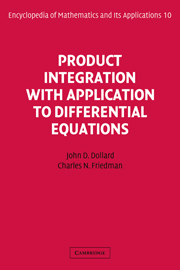Book contents
- Frontmatter
- Contents
- Editor's Statement
- Section Editor's Foreword
- Preface
- Introduction
- Product Integration with Applications to Differential Equations
- Chapter 1 Product Integration of Matrix-Valued Functions
- Chapter 2 Contour Product Integration
- Chapter 3 Strong Product Integration
- Chapter 4 Applications
- Chapter 5 Product Integration of Measures
- Chapter 6 Complements; other Work and further Results on Product Integration
- Appendix I Matrices
- Appendix II The Place of Multiplicative Integration in Modern Analysis
- Index
- About the authors
Chapter 5 - Product Integration of Measures
Published online by Cambridge University Press: 05 June 2013
- Frontmatter
- Contents
- Editor's Statement
- Section Editor's Foreword
- Preface
- Introduction
- Product Integration with Applications to Differential Equations
- Chapter 1 Product Integration of Matrix-Valued Functions
- Chapter 2 Contour Product Integration
- Chapter 3 Strong Product Integration
- Chapter 4 Applications
- Chapter 5 Product Integration of Measures
- Chapter 6 Complements; other Work and further Results on Product Integration
- Appendix I Matrices
- Appendix II The Place of Multiplicative Integration in Modern Analysis
- Index
- About the authors
Summary
Introduction
In this chapter we shall extend some of the theory developed so far by introducing the notion of the product integral of a measure. This extension is a quite natural one from several points of view. On the one hand, from a purely integration-theoretic viewpoint, one might envision the possibility of product integrating the most general objects of ordinary integration theory, especially in the light of the development so far. Of course, it would be expected that such a theory would be closely related to the theory of (linear) differential equations with measures as coefficients. Such equations have occasionally been considered ([VG], [DP]) at least in special cases, but usually not in any systematic manner. They have some importance, however; for example, one problem in (quantum mechanical) scattering theory concerns the description of self-adjoint operators H with a part unitarily equivalent to operating in L2(ℝn), and some of these operators are of the form H = H0 + μ, with μ a measure. The scattering theory associated with such operators may be developed by using the product integral to study the asymptotic form of solutions of the equation Hψ = k2ψ.
- Type
- Chapter
- Information
- Product Integration with Application to Differential Equations , pp. 151 - 186Publisher: Cambridge University PressPrint publication year: 1984

